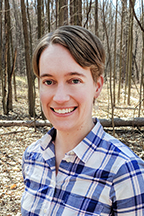
Shauna Paradine
she/her | they/them
Assistant Professor of Chemistry
PhD, University of Illinois at Urbana-Champaign, 2015
- Office Location
- 453 Hutchison Hall
- Telephone
- (585) 276-5822
- Web Address
- Website
Research Overview
The topological and stereochemical complexity inherent in molecular scaffolds with high sp3 character imparts beneficial physical and biological properties relative to sp2-rich compounds, but also amplifies selectivity and reactivity challenges for their efficient synthesis. Modular strategies for the rapid and selective construction of stereodefined sp3-rich molecules would enable access to a broad range of chemical space and advance a significant frontier in organic synthesis. The Paradine group is interested in leveraging the tools of reaction discovery, transition metal catalysis, and mechanistic investigation to solve important problems in organic synthesis.
Our group’s research is centered on the discovery of selective catalytic methods for the efficient construction of sp3-rich molecules, with a specific focus on C‒C bond formation. A particular priority is placed on transformations that use simple starting materials and lead to a significant increase in molecular complexity. The following are a selection of projects that our group is exploring.
Project 1: We are developing unconventional ligand platforms for palladium catalysis, with a particular interest in leveraging ligand design to enable olefin heteroannulation and carbofunctionalization reactions.
Project 2: We are developing selective and robust methods for oxidative, radical addition reactions of alkenes and arenes using ligand-enabled copper catalysis.
In all cases, we seek to discover catalytic synthetic methodologies that exert precise control over reaction outcomes (i.e. enantioselectivity, site-selectivity, chemoselectivity, diastereoselectivity), and undertake fundamental studies to understand the factors that contribute to highly selective transformations.
This research provides ample opportunities for applications to catalysis, total synthesis, medicinal chemistry, and other areas. Collaborations with colleagues across disciplines will be sought out to realize the full potential of our group’s research. Students in our group will gain expertise in organic synthesis and catalytic reaction discovery. In addition, students will learn diverse techniques in physical and mechanistic organic chemistry, spectroscopic characterization of organic compounds and transition metal complexes, computational chemistry, and the synthesis and investigation of transition metal complexes.
Research Interests
- Organic Chemistry and Organometallic Chemistry
Selected Publications
- Houghtling, K.E.; Canfield, A.M.; Paradine, S.M. “Convergent synthesis of dihydrobenzofurans via urea ligand-enabled heteroannulation of o-bromophenols with 1,3-dienes.” Organic Letters, 2022, 24, 5787-5790. DOI: 10.1021/acs.orglett.2c02301
- Vaith, J.; Rodina, D.; Spaulding, G.C.; Paradine, S.M. “Pd-Catalyzed Heteroannulation using N-Arylureas as a Sterically-Undemanding Ligand Platform.” Journal of the American Chemical Society, 2022, 144, 6667-6673. DOI: 10.1021/jacs.2c01019
